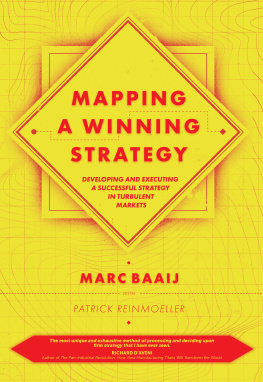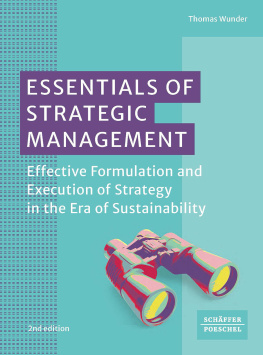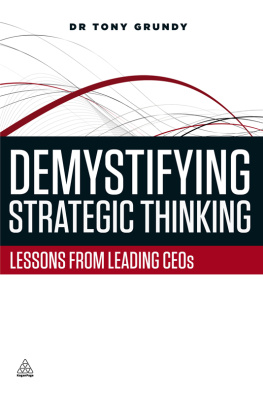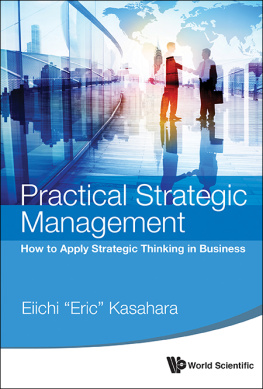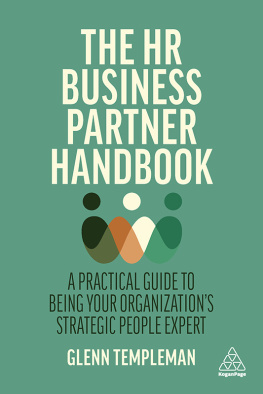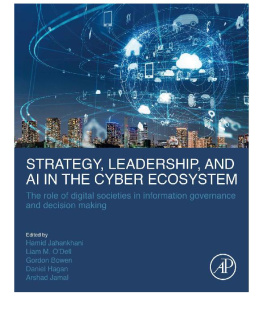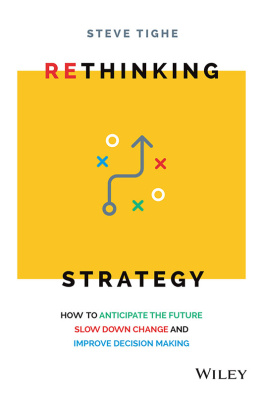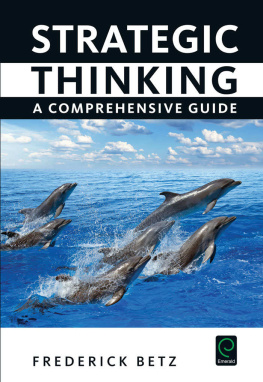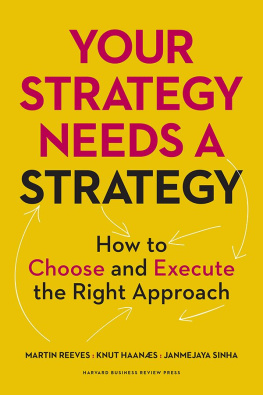No part of this book may be reproduced, stored in a retrieval system, transmitted in any form or by any means electronic, mechanical, photocopying, recording or otherwise without either the prior written permission of the publisher or a licence permitting restricted copying issued in the UK by The Copyright Licensing Agency and in the USA by The Copyright Clearance Center. Any opinions expressed in the chapters are those of the authors. Whilst Emerald makes every effort to ensure the quality and accuracy of its content, Emerald makes no representation implied or otherwise, as to the chapters suitability and application and disclaims any warranties, express or implied, to their use.
ACKNOWLEDGEMENTS
Mapping a Winning Strategy builds on best practices in strategy. We owe a great deal to the work of leading strategic thinkers, such as DAveni, Christensen, Courtney, Eisenhardt, Kotter, Kim, Liedtka, Martin, Mauborgne, Mintzberg, OReilly, Porter, Rumelt, Sull, Takeuchi, Teece, Tushman, Van den Steen and Zenger. In particular, we build on the valuable structured problem solving method as successfully introduced in management consultancy by McKinsey & Company, and as described in various publications by former employees of this firm, such as Minto, Rasiel and Friga.
This book is based on 16 years of work (20022017). Besides literature research, we have learned a great deal from strategy consulting to managers, as well as from training managers on strategy and coaching them on application to their own practice. We also benefited from teaching business students and supervising them on real-world field projects. Working with hundreds of managers and students over the years, enabled us to gain deep insights into the practical challenges of strategy. This work also inspired the development of the Mapping Method, and it challenged us to explain the method in the best way possible. Working with all of them has been a source of inspiration. We are indebted to our schools, Rotterdam School of Management at the Erasmus University Rotterdam and the School of Management of Cranfield University, which provided room to explore and test our thinking. We feel privileged to have worked with inspiring colleagues and guest lecturers, among whom we would like to mention James Parker, Jacomijn Klitsie, Paul Pietersma, Mark Jenkins and Cliff Bowman, in particular.
We are also indebted to many people with whom we discussed ideas and parts of the many, early versions. We especially owe thanks to the reviewers of the manuscript in the final stretch. Our publisher organized blind reviews of the manuscript. We would like to thank these anonymous reviewers for their very constructive feedback. The book title was one of their helpful suggestions. In addition to the blind reviews, we invited reviewers ourselves. We have been privileged to receive additional, valuable feedback from very knowledgeable executives and business school professors with extensive experience in strategic management and/or strategy consulting at top-tier firms. The valuable reviews of the named and anonymous reviewers helped us make the manuscript better, simpler and shorter. We are much indebted to Hugh Courtney, Eric Van den Steen, Jan-Hein Jesse, Arnaud Chevallier, Kirsten Timmermans, Sigrid De Wever, Albrecht Enders, Jeremy Bentham, Joe Peppard, Annet Aris, Phebo Wibbens, Yoko Ishikura, Kalin Anev Janse, Ansgar Dierkes, Bas Vijfwinkel and Paul van der Heijden. Needless to say, any remaining errors and shortcomings in the manuscript are our own.
We also owe gratitude to Pete Baker, Kerry Laundon and Eve Hawksworth of Emerald Publishing for their professional support. Additionally, we thank Steven Hardman, our publishing consultant, for his work, and Marno Verbeek for making this vital connection.
Finally, we like to thank our wives, Ellen and Kumiyo, and daughters, Sophie and Karna. Writing this book in our spare time meant substantially less time for them. Their support and patience were critical success factors.
CONTENTS
Appendices
LIST OF FIGURES
Appendix figures
LIST OF ABBREVIATIONS
CSF | Critical Success Factors |
EMEA | Europe, Middle East and Africa |
HR | Human Resources |
IP | Intellectual Property |
ISO | IssueStrategyOrganization |
M&A | Mergers and Acquisition |
NGO | Non-Governmental Organization |
MECE | Mutually Exclusive and Collectively Exhaustive |
PESTEL | Political, Economic, Sociological, Technological, Environmental and Legal (developments) |
R&C | Resources & Capabilities |
ROIC | Return On Invested Capital |
SMART | Specific, Measurable, Achievable, Relevant and Time-bound |
SO | Strategy-Organization |
SPS | Structured Problem Solving |
SWOT | Strengths, Weaknesses, Opportunities and Threats |
VUCA | Volatility, Uncertainty, Complexity, Ambiguity |
WACC | Weighted Average Cost of Capital |
ABOUT THE AUTHORS
Marc G. Baaij, PhD, is Associate Professor of Strategy at the Erasmus University in The Netherlands. He focusses on strategy methods and is active in executive education, coaching of managers on real-world strategy projects, and on a personal title, he provides strategy advice. Baaij has previously been a Strategy Consultant and a Research Manager at the Boston Consulting Group. Marc has (co)authored many articles for scientific and professional journals, as well as professional titles and textbooks on strategy and problem-solving methods used by top-tier consultants. He has also worked for IBM and holds degrees in economics and strategy.
Patrick R. Reinmoeller, PhD, is Professor of Strategic Management and the Academic Head of Directors as Strategic Leaders, one of the most successful open programmes at Cranfield School of Management (Cranfield University, UK). He was a Professor at the Japan Advanced Institute of Science and Technology and Erasmus University, where he retains a part-time position. His research on innovation, organizations and strategy has been published in Academy of Management Journal

